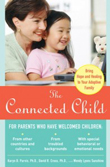
Pamela Kruger and Jill Smolowe, co-editors of A Love Like No Other: Stories from Adoptive Parents, characterize adoption literature as thick with answers to questions about the adoption process but stunningly thin on matters that touch on the actual raising of adopted children. The information conveyed often measures children’s developmental and behavioral milestones against a yardstick that may not apply to children who were adopted from orphanages or the foster care system, or at older ages.
Kruger and Smolowe describe adoption issues with words like complex, nuanced, and ongoing. If you’re an adoptive parent, you understand what they mean. No matter how competently a parent addresses his or her child’s concern in the given moment, the issue refuses to wind down tidily and disappear along with cribs, crayon, or curfews. Instead, the issues take root early on, and then burrow deeper as the child grows older. Over time, they tend to evolve, not resolve; mature, not melt away.
While research shows that the vast majority of adoptive parents are satisfied with their decision to adopt, it is also important to know the post-adoption period can present difficulty for many children at varying developmental stages. Challenges may materialize after a brief “honeymoon” period or creep into the family much later. Either way, understanding how the experience of adoption is felt by a child, at different times and in different settings, is an important beginning step to supporting children through these struggles.
The resources featured in this section are provided to help impart perspective on the adoption overlay to parenting.
Allyson Powell, LCSW
Program Director
UConn Health Center
Adoption Assistance Program
and Adoptive Parent
Learn More
Featured Reading
The Connected Child
 Karyn Purvis, David Cross and Wendy Sunshine, 2007
Karyn Purvis, David Cross and Wendy Sunshine, 2007
The adoption of a child is always a joyous moment in the life of a family. Some adoptions, though, present unique challenges. Welcoming these children into your home—and addressing their special needs—requires care, consideration, and compassion. Written by two research psychologists specializing in adoption and attachment, The Connected Child will help you: build bonds of affection and trust with your adopted child, effectively deal with any learning or behavioral disorders, and discipline your child with love without making him or her feel threatened.
Visit the TCU Institute of Child Development and find additional resources.
Online Learning
Becoming Your Child’s Best Advocate
Online course offered by Adoption Learning Partners
Advocacy begins even before a child joins his or her adoptive family and continues throughout childhood. This course will help you understand why you are the best advocate for your adopted child, determine your need for services, and find resources available to assist your family.
Brothers and Sisters in Adoption: A Discussion with the Experts
Webinar offered by Adoption Learning Partners
Arleta James discusses helping children navigate relationships when new kids join the family. Our experts will share transition tips and strategies for welcoming a toddler or school-aged child home, focusing on preparing brothers and sisters prior to adoption and the first year after adoption.
Is it an Adoption Thing?
Webinar offered by Adoption Learning Partners
When your child exhibits challenging or frustrating behaviors, do you: (a) immediately assume it’s related to his or her adoption history? (b) Not even consider adoption? (c) Struggle to determine when to point to adoption and when to assume it’s just “kids stuff”? Because many families struggle with the difficult task of sorting out if behaviors and challenges are adoption-related or not, we’ve asked an expert to help! Join Dr. Gregory Keck, Director of the Attachment and Bonding Center of Ohio, as he discusses the impact of adoption and trauma on child development.
Overwhelmed for the Holidays: An Adoptive Parent’s Guide to Navigating the Holidays
Webinar offered by Adoption Learning Partners
Traveling, family gatherings, and holiday foods and music are all special parts of celebrating the holidays. But for many children, especially those with sensory sensitivities or who may have only recently come into their adoptive home, the frenzy of the holidays can push them beyond their ability to cope. This webinar will help you understand your child’s capacity to cope and help him or her regulate behaviors.
Tough Starts: Parenting Matters
Online course offered by Adoption Learning Partners
Parenting Matters applies a strengths-based, therapeutic approach to parenting in order to heal a child who has had a tough start in life. This approach to parenting is deliberate and intentional and goes well beyond parenting based on instinct or tradition. Exercises, family stories, and expert advice help instruct parents on how to maximize their own strengths, and their child’s, in order to offset and work around troublesome vulnerabilities and threats. The goal is to help parents respond to their child more insightfully, therefore more appropriately redirecting negative behavior.
Articles and Websites
Complex Trauma: Facts for Caregivers
National Child Traumatic Stress Network, 2014
Parenting a Child Who Has Experienced Abuse or Neglect
Child Information Gateway, December 2013
Helping Your Foster Child Transition to Your Adopted Child
Child Information Gateway, February 2012
The Joys and Challenges of Parenting Older Adopted Children
National Council for Adoption, November 2014
Parenting Your Adopted Preschooler
Child Welfare Information Gateway, January 2015
Parenting Your School-Age Child
Child Welfare Information Gateway, January 2015
Parenting Your Adopted Teenager
Child Welfare Information Gateway, April 2015
Recommend an article or other resource
Please note: The Adoption Assistance Program (AAP) does not promote or endorse any websites, organizations or individuals that may be linked from this site. The AAP does not guarantee the accuracy of the information or the appropriateness of advice for a particular situation. It is our intent to assist users in their search for reliable and useful sources of information pertaining to adoption, legal guardianship, and parenting.